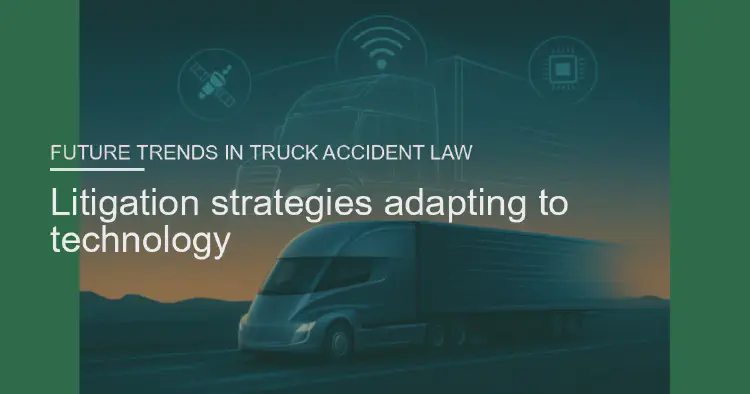Litigation strategies adapting to technology
As trucking becomes increasingly data-driven, litigation strategies are evolving to incorporate new forms of digital and technological evidence in accident cases.
- Truck Accident Law Team
- 2 min read
Article 5 of 6 in Future Trends in Truck Accident Law/

Litigation Strategies Adapting to Technology in Truck Accident Cases
Digital Evidence Collection
- Attorneys now rely on Electronic Logging Devices (ELDs), black box data, GPS records, and telematics.
- Forensic experts are hired to interpret software logs, braking patterns, and speed data.
Use of AI and Data Analytics
- Artificial intelligence tools help reconstruct accidents with simulations based on sensor data.
- Predictive analytics identify patterns of negligence, such as repeated Hours of Service violations.
- AI-powered platforms streamline discovery by reviewing large volumes of digital records.
Enhanced Accident Reconstruction
- 3D modeling, drone footage, and advanced software are used to recreate accident scenes.
- Provides compelling visual evidence for juries.
- Helps counter defense claims that minimize negligence.
Cybersecurity and Data Integrity
- Lawyers must address risks of data tampering or hacking in autonomous or connected trucks.
- Chain-of-custody protocols for digital evidence are more critical than ever.
- Expert witnesses increasingly include cybersecurity specialists.
Discovery Strategies
- Attorneys demand broader access to software updates, driver-assist system data, and telematics logs.
- Defense teams argue over proprietary information, creating new legal battles over disclosure.
Presentation in Court
- Judges and juries may struggle with technical complexity.
- Attorneys adapt by simplifying digital evidence with visuals, expert testimony, and analogies.
- Technology can both strengthen credibility and risk overwhelming lay jurors.
Impact on Legal Standards
- Courts adapt standards of admissibility for digital evidence, ensuring reliability and scientific validity.
- Precedents are emerging around whether failure to adopt safety technology can be considered negligence.
Summary: Litigation strategies in truck accident cases are evolving with technology, using AI, digital evidence, and advanced reconstructions. Attorneys must master new tools, ensure cybersecurity, and present complex data in accessible ways to persuade judges and juries.
You might also like:
- Tags:
- Black Box
- Hours Service
- Expert Testimony
- Box Data
- Accident Reconstruction
- Electronic Logging
- Expert Witnesses
- Litigation Strategies
- Gps Records
- Devices Elds
- Logging Devices
- Safety Technology
- Service Violations
- Data Gps
- Digital Evidence
- Black Box Data
- Electronic Logging Devices
- Logging Devices Elds
- Hours Service Violations
- Box Data Gps
- Data Gps Records
- Identify Patterns Negligence
- Strategies Truck Accident
- Devices Elds Black
- Elds Black Box